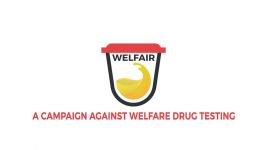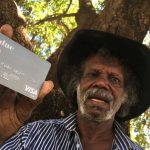Disabled Pensioners: the Government’s New Drug War Targets

The Turnbull government has hit a new low in its war against drugs. Legislation has just been tabled that proposes to deny the pension to hundreds of people who are currently deemed disabled due to their level of drug or alcohol dependency.
It’s well known Australian states and territories run roadside drug testing programs that are more to do with zero-tolerance, than road safety. Police don’t actually test for driver impairment, instead minute traces of certain drugs can render a positive reading – drugs which may have been consumed days prior and no longer affect driving.
As part of this year’s federal budget, the government announced another zero-tolerance program. It plans to commence drug testing trials of 5,000 new welfare recipients as of January 1 next year. And those who test positive will be put onto cashless welfare cards.
Legislating to debilitate
However, one part of the budget that’s generally been overlooked is that the government is also proposing that as of July 1 this year, people will no longer be able to qualify for the Disability Support Pension (DSP) on the basis of a substance use disorder.
Australian social services minister Christian Porter tabled the Social Security (Tables for the Assessment of Work-related Impairment for Disability Support Pension) Amendment Determination 2017 before federal parliament last Thursday.
If the law is passed, around 450 people a year with chronic substance use disorder will no longer be eligible for the DSP. And current recipients could have their benefits cancelled if the social security department decides to medically review them.
Taking from those at risk
Founder of the Welfair campaign Nevena Spirovska said the proposal will harm some of “the most vulnerable people in our community,” as those with severe substance use disorder “are unable to modify their behaviour even in the face of known negative consequences.”
The new law, if passed, would delete Table 6 from the Social Security Determination 2011.
The table currently allows access to the DSP to individuals who suffer from an “extreme” or “severe” permanent condition resulting in “functional impairment due to excessive use of alcohol, drugs or other harmful substances” – like glue or petrol – or the misuse of prescription drugs.
Ms Spirovska explains that under the new law, these people will now be moved onto Newstart or Youth Allowance, which requires them to seek employment. “The expectation that they will cease their drug use to participate in job search requirements is not realistic,” she stated.
The Welfair campaign is currently targeting the Nick Xenophon Team, along with other crossbenchers, such as Jacqui Lambie and Derryn Hinch, with evidence as to “why this is a disastrous idea,” as the legislation will need these senators’ support if it is to be passed.
The war on welfare recipients
The Coalition government asserts that the new law is to “ensure taxpayers’ money is not being used to fund drug addictions.”
However, the ABC reported that the average cost of these sorts of tests in the US range from around $43 to $1,148. Assuming it will be $100 in Australia, the program will cost at least $500,000 in testing alone.
So to many, it seems the proposal is more about an escalation of war on drugs aimed at disability support pensioners, as well as unemployment benefit recipients, rather than trying to save taxpayer dollars.
A zero-tolerance approach
Welfare drug testing will involve the random testing of 5,000 new recipients of Newstart and Youth Allowance as of next year. Those who fail the initial test will be placed on “welfare quarantining,” which is the controversial cashless welfare card.
This restricts how a recipient can spend their money, as 80 percent of their social security payment cannot be accessed as cash, or used to buy alcohol or to gamble.
Welfare recipients that initially test positive will be tested a second time. If they then fail subsequent drug tests, they’ll be sent to see a medical professional “for an assessment of their substance abuse issues and any appropriate treatment options.”
According to Ms Spirovska, the program is “heinous,” as it will “push people who don’t necessarily have any kind of issues with drugs outside the scope of social security.” Indeed, these sorts of testing programs are unable to differentiate between recreational and problematic drug use.
So targeted, it’s hard to miss
The government has repeatedly stated that welfare drug testing will be random. However, it seems their interpretation of random is a little more systematic than most people would generally expect.
Australian treasurer Scott Morrison has outlined that trials will be carried out at three sites, which will be “targeted areas” known to be locations of high drug use. And to find these sites the government is going to test the nation’s sewage for illicit substances.
Once these locations, have been found the government is going to select which unemployed people to test using “a data-driven profiling tool developed for the trial to identify relevant characteristics that indicate a higher risk of substance abuse issues.”
Motion to halt voted down
Australian Greens senator Rachel Siewert said in May that she was concerned Bunbury in Western Australia would be chosen as a site for the trials, after the National Wastewater Drug Monitoring Program in March pinpointed that town as an area of high methamphetamine use.
The senator put forward a motion in the federal parliament last week calling on the government to drop the proposal. However, this was voted down 58 to 9 because Labor opposed it.
Ms Siewert pointed out that a 2013 position paper by the Australian National Council on Drugs found there would be “ethical and legal issues” in trying to implement such a program.
It’s hardly fair
Welfair are currently running an online petition calling for parliament to reject the government’s proposed trials. “This policy wasn’t written or informed by anyone from the drug and alcohol, or the legal sector,” Ms Spirovska told Sydney Criminal Lawyers®. “It’s been written in isolation.”
The campaign is providing legal information regarding the proposals, as well as access to a director of health and support services. At present, the group are pushing hard to call a halt to the changes to the Disability Support Pension.
These are changes that will ultimately penalise people currently deemed disabled due to their substance use disorder. And the only reason this group, and not others, are being denied the pension is that their disability is drug and alcohol-related.
Welfair are currently running a crowdfunding campaign to raise awareness about the government’s proposals, and to provide support and legal information to people who may be adversely affected by them.








